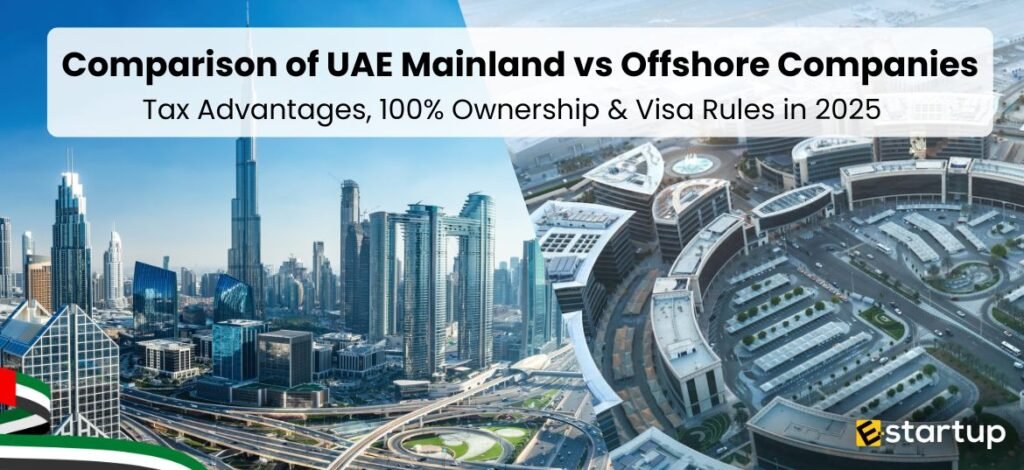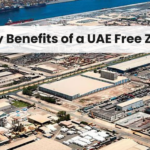Full Comparison of UAE Mainland vs Offshore Companies: Tax Advantages, 100% Ownership & Visa Rules in 2025
The United Arab Emirates (UAE) is currently among the most favorable destinations among international investors, entrepreneurs, and expatriates who would like to have solid business foundations. The changing legal environment, investor-friendly policies, and the efforts of diversifying the economy has made the country the formation company magnet. Nevertheless, the question that is most asked by new investors is: What business structure is more appropriate- Mainland or Offshore?
This blog contains a Full Comparison of the UAE Mainland vs Offshore Companies in 2025, their taxation, ownership regulations, visa prospects, and feasible prerequisites. The following detailed guide will also assist you whether planning to register a company in the UAE or expand an existing one and determine the jurisdiction that suits your objectives.
Introduction to UAE Mainland and Offshore Companies
It is necessary to have a feel of what each jurisdiction entails before going down into the comparisons:
- Mainland Companies: The Department of Economic Development (DED) of every emirate licenses these. The mainland entities are also permitted to operate both locally within the UAE market and global.
- Offshore Companies: Offshore entities are primarily applied to international business, asset protection, holding structure, and tax efficiency and are registered under various jurisdiction including the JAFZA Offshore, Rak ICC or Ajman Offshore. Expatriate companies cannot be allowed to operate in the UAE local market.
These two models possess their own enumerated benefits and drawbacks as we will examine.
Full Comparison of UAE Mainland vs Offshore Companies
-
Business Ownership Rules in 2025
Mainland Companies: Until recently, foreign investors needed a local Emirati sponsor who has 51 percent shares. But, the reforms have brought in 100% foreign ownership of most of business activities. This will make mainland an attractive place to international entrepreneur who would like to have complete control of the company.
Offshore Companies: With offshore entities, there is a possibility to have 100 percent foreign ownership at inception. But ownership is in the first place a question of possession of assets, administration of international trade, and organization of wealth, rather than of local business operation.
Verdict: Each of them has 100 percent ownership in case of 2025, but Mainland has direct access to the UAE economy, and Offshore has restricted operations to international affairs.
-
Taxation Advantages
- Corporate Tax (9 on the profits of AED 375,000 and above).
- VAT (5% charge imposed on goods and services).
- There are some exemptions of free zone-linked mainland entities.
- No corporate taxes, no VAT and no customs.
- Offshore bodies have the advantage of zero-taxation because they are not operating in the UAE.
Verdict: Offshore firms are more beneficial in taxations. Nevertheless, the offshore companies have no access to the local contracts and government tenders that the Mainland companies can get.
-
Market Access
Mainland Companies: Companies have the liberty to trade in the UAE domestic market, challenge government bids and grow in all the seven emirates.
Offshore Companies: Can not operate in the UAE market directly. The only objective that offshore companies can play is that of holding, asset protection or international trading of assets.
Verdict: Mainland company is the winner in local and regional trade and Offshore is the winner in global structuring and securing assets.
-
Visa Eligibility and Rules
Mainland Companies:
- UAE residence visas are open to the investors and employees.
- The quantity of visas is dependent on the size and activity of the office.
- Golden Visa solutions to major investors and entrepreneurs.
Offshore Companies:
- The offshore companies are not able to sponsor investor or employee visas.
- The reason why they are used is to structure wealth and tax planning as opposed to relocation.
Verdict: Mainland has the edge over the Free Zones in that your goal is to reside in the UAE or recruit employees. International holding and tax optimization are optimized better in offshore.
-
Regulatory Authorities
Mainland Companies: each emirate Department of Economic Development (DED).
Offshore Companies: Depending on the offshore jurisdiction like JAFZA Offshore, RAK ICC or Ajman Offshore.
Verdict: Both of them require compliance and renewal on an annual basis, but offshore arrangements usually require less documentation.
-
The Cost of registering a company in the UAE.
Mainland Companies:
- The cost differs within emirates and business operation.
- Incurs license charges, office rent charges and visa sponsorship charges.
Offshore Companies:
- Very inexpensive as opposed to mainland.
- Registration normally contains only incorporation and renewal expenses and no office rentals are necessary.
-
Reputation & Banking
Mainland Companies: Known both at the international level and nationally, which simplifies the process of opening a corporate bank account.
Offshore Companies: Global anti-money laundering checks sometimes make offshore companies more difficult to open bank accounts.
Which Option is Right for You in 2025?
The choice between UAE Mainland vs Offshore Companies depends on your business goals:
- A Mainland company will be your best option in case you intend to trade locally, reside in the UAE, or employ employees.
- When you are interested in holding assets, tax efficiency and are operating internationally, then an Offshore company is more appropriate.
To make a middle ground, some entrepreneurs have the combination of both structures: an offshore company to hold and a mainland company to be operated.
Comparison Table: UAE Mainland vs Offshore Companies in 2025
| Criteria | Mainland Company | Offshore Company |
|---|---|---|
| Ownership | 100% foreign ownership available for most activities | 100% foreign ownership allowed |
| Market Access | Can trade directly in the UAE and bid for government contracts | Cannot trade within the UAE; only international business and asset holding allowed |
| Taxation | 9% corporate tax above AED 375,000; 5% VAT applies | No corporate tax, no VAT, and no customs duty |
| Visa Eligibility | Can sponsor investor and employee residence visas | Cannot sponsor visas for investors or employees |
| Company Registration Cost | Higher due to office rental, license, and visa costs | Lower, no physical office needed |
| Banking | Easier to open local and international corporate bank accounts | Bank account opening possible but faces stricter scrutiny |
| Reputation | Highly reputable both locally and globally | Recognized internationally but limited in local credibility |
| Best For | Businesses targeting UAE market, expatriates seeking residency, and expansion locally | Asset protection, holding structures, and international trading |
Importance of Expert Guidance in UAE Company Registration
The UAE has simplified processes, and to be able to choose the appropriate structure, one needs to know about legalities, licensing, and compliance. Hiring professional consultants will help to ensure that the UAE Company Registration process will be smooth without making expensive errors.
Conclusion
In the Full Comparison of UAE Mainland vs Offshore Companies in 2025, it is evident that both forms will have various needs of the investors. Mainland structures are best suited to individuals who wish to live, conduct and expand their operations in the UAE market, whereas offshore structures offer unparalleled benefits in international tax planning and asset management.
Think and review your objectives, budget and growth plans in business before coming up with a decision. UAE Company Registration will be done with professional consultation to make sure that you make the right direction towards success in the long run.
FAQs
Q1. Is it possible to own property in UAE by an offshore company?
Yes, however, not everywhere but under the conditions of particular zones and it should be according to the rules in a particular emirate. As an illustration, the offshore businesses of JAFZA are allowed to own property in the free hold regions of Dubai.
Q2. Are offshore companies charged with corporate tax in the UAE?
No, offshore companies are not subject to corporate tax since they can not enjoy local UAE business.
Q3. Is it possible to get offshore company residence visa?
No, business is not possible with offshore companies to sponsor visas. To that, you require a mainland or free zone company.
Q4. Are the registration fees of UAE Mainland Company high as compared to offshore?
Surely, the process of mainland establishment is comparatively more expensive based on license fee, office leasing, and visa expenses. Offshore arrangements are less expensive.
Q5. Will it be possible to have a mainland company that is 100 percent owned by a foreigner in 2025?
Yes, there is no necessity of having a local sponsor in most of the business activities in which 100 percent foreign ownership is permitted.
Q6. What kind of company is more suitable in trading internationally?
Offshore company is more suitable to international trade and protection of assets because of the tax benefits and minimal maintenance cost.
Q7. Could there be a conversion of an offshore company to a mainland company?
No, it is not allowed to be converted. In order to enter the UAE market, you have to establish a separate mainland entity.













